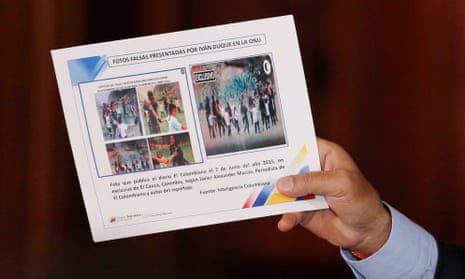Colombia’s intelligence chief has resigned over a discredited dossier which supposedly proved that Venezuelan authorities were sheltering Colombian rebels, amid an escalating information war between the two neighbouring countries.
The Colombian president, Iván Duque, brandished the file at the United Nations general assembly in New York last week, claiming that it was “conclusive proof” that Venezuela’s president, Nicolás Maduro, was harbouring Colombian guerrillas.
Ample evidence has emerged to support Colombia’s concerns; the presence of fighters from the National Liberation Army (ELN) has been reported hundreds of miles across the border, and the group is believed to be responsible for a string of massacres in rural Venezuela last October.
But it soon emerged that Duque’s dossier included years-old, uncredited press photos, which were actually taken in Colombia – not in Venezuela.
Colombian officials dismissed the issue as a simple failure to credit sources, but late on Monday, the armed forces’ intelligence chief, Gen Oswaldo Peña, resigned.
In a letter to Duque, Peña claimed he was resigning for personal reasons, though made mention of the scandal. “As a general of the republic, I am conscious of the need to take responsibility for my actions and those of my subalterns, so am acting accordingly,” he wrote.
Diplomatic relations between Colombia and Venezuela have grown increasingly strained since Bogotá backed Juan Guaidó, the Venezuelan opposition leader who has become the figurehead of opposition to Maduro.
Chief among Colombia’s criticisms of the Venezuelan president are accusations that he has sheltered Colombian leftist militias including the ELN and the now-demobilised Revolutionary Armed Forces of Colombia (or Farc).
Farc signed a peace deal with the Colombian government in 2016, but when two dissident rebel leaders announced in August that they were returning to war, Colombian officials claimed they were already in Venezuela.
However, analysts say Colombia is shooting itself in the foot with its repeated blunders, especially after photographs emerged last month of Guaidó posing with rightwing Colombian paramilitaries while crossing the border in February.
“It sure seems like, through sheer carelessness, the Colombian government keeps handing undeserved propaganda victories to the Maduro regime,” said Adam Isacson, a security analyst at the Washington Office on Latin America, a thinktank.
“US, Colombian and Venezuelan non-governmental organizations and media outlets have already produced credible reports of Venezuelan cooperation with Colombian guerrilla groups,” Isacson went on to say. “The Duque government’s sloppiness is undercutting that narrative.”
Maduro’s government also used its appearance at the UN to weaponize false information. Vice-President Delcy Rodríguez presented coordinates for what she described as camps inside Colombia where “terrorists” were plotting against Venezuela.
But the local website Colombia Reports found that two of the coordinates were locations in the Caribbean sea, while the third appeared to be the front yard of a house in the Colombian city of Maicao.
